深圳牛津英语八上期中Unit1--Unit4知识点复习
文档属性
| 名称 | 深圳牛津英语八上期中Unit1--Unit4知识点复习 | 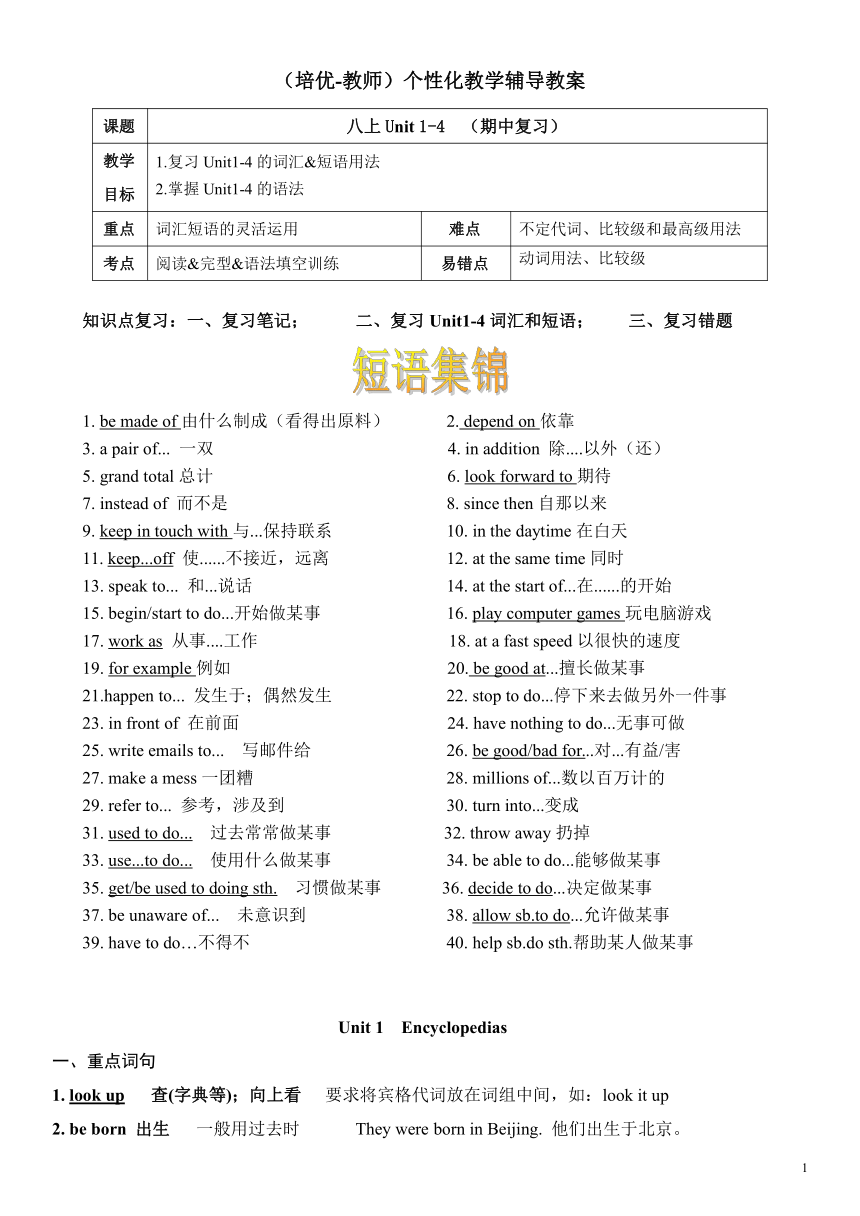 | |
| 格式 | zip | ||
| 文件大小 | 144.1KB | ||
| 资源类型 | 教案 | ||
| 版本资源 | 牛津深圳版 | ||
| 科目 | 英语 | ||
| 更新时间 | 2021-10-10 15:08:21 | ||
图片预览

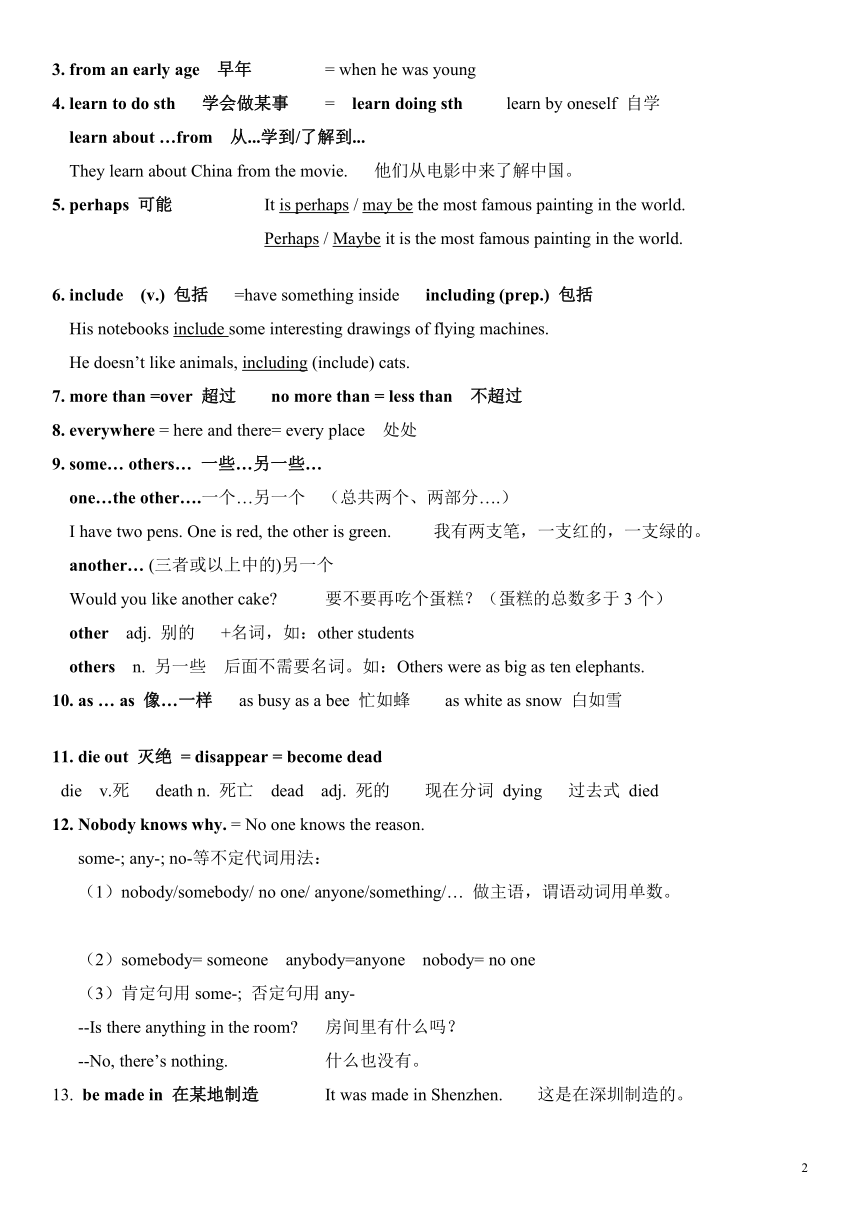
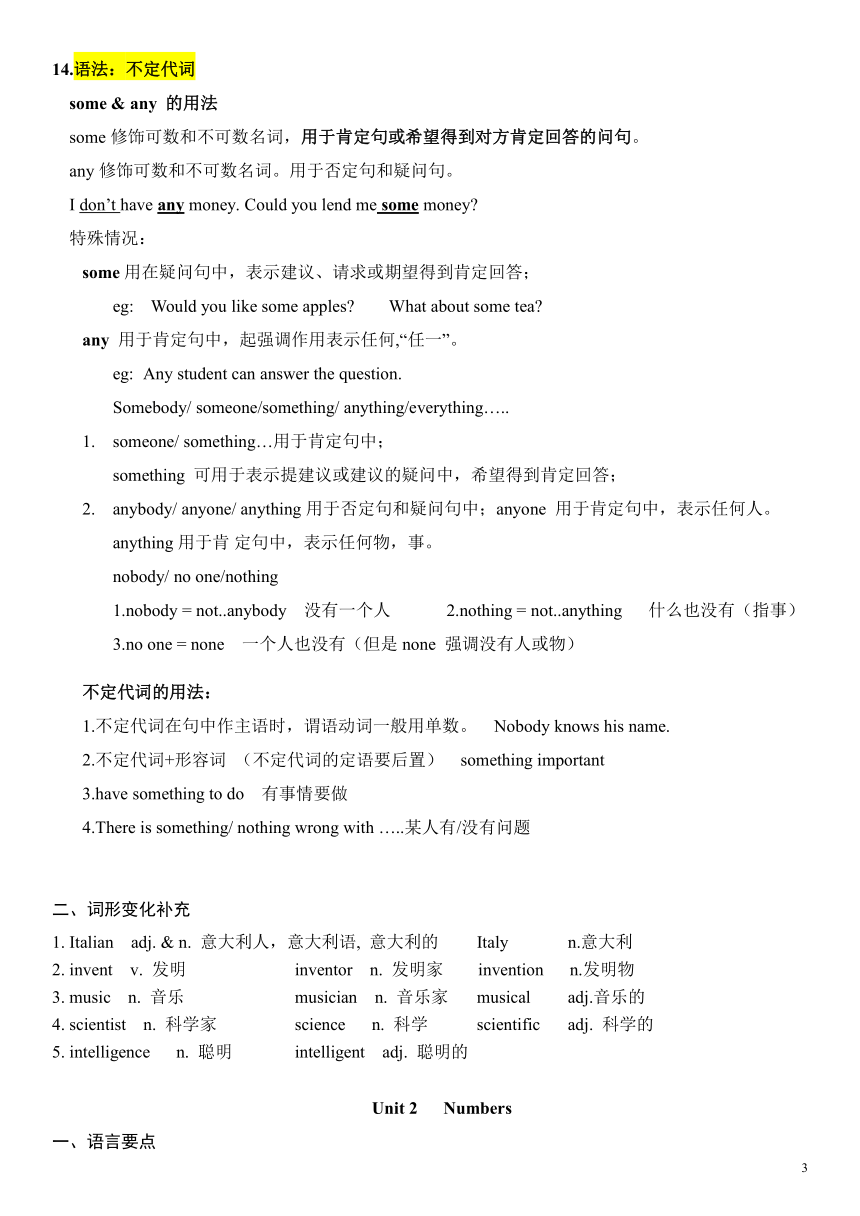
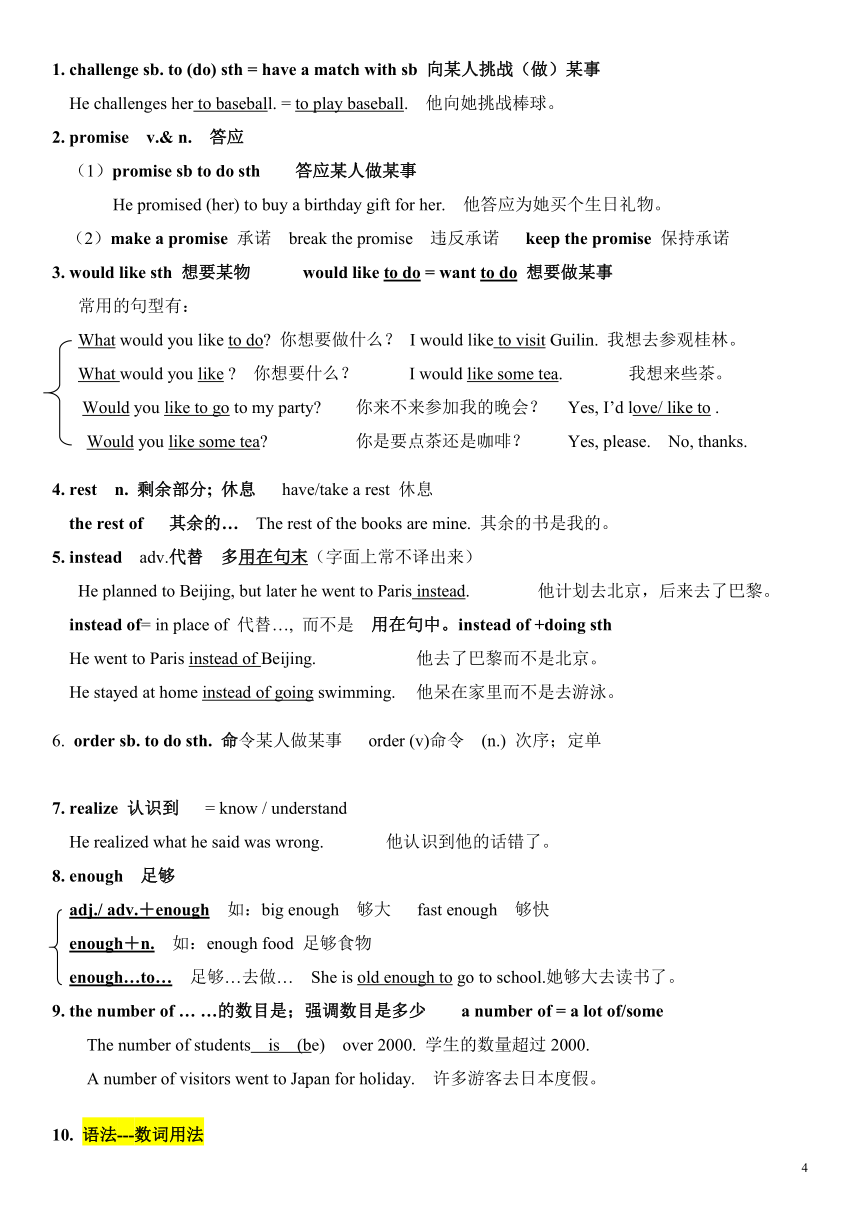
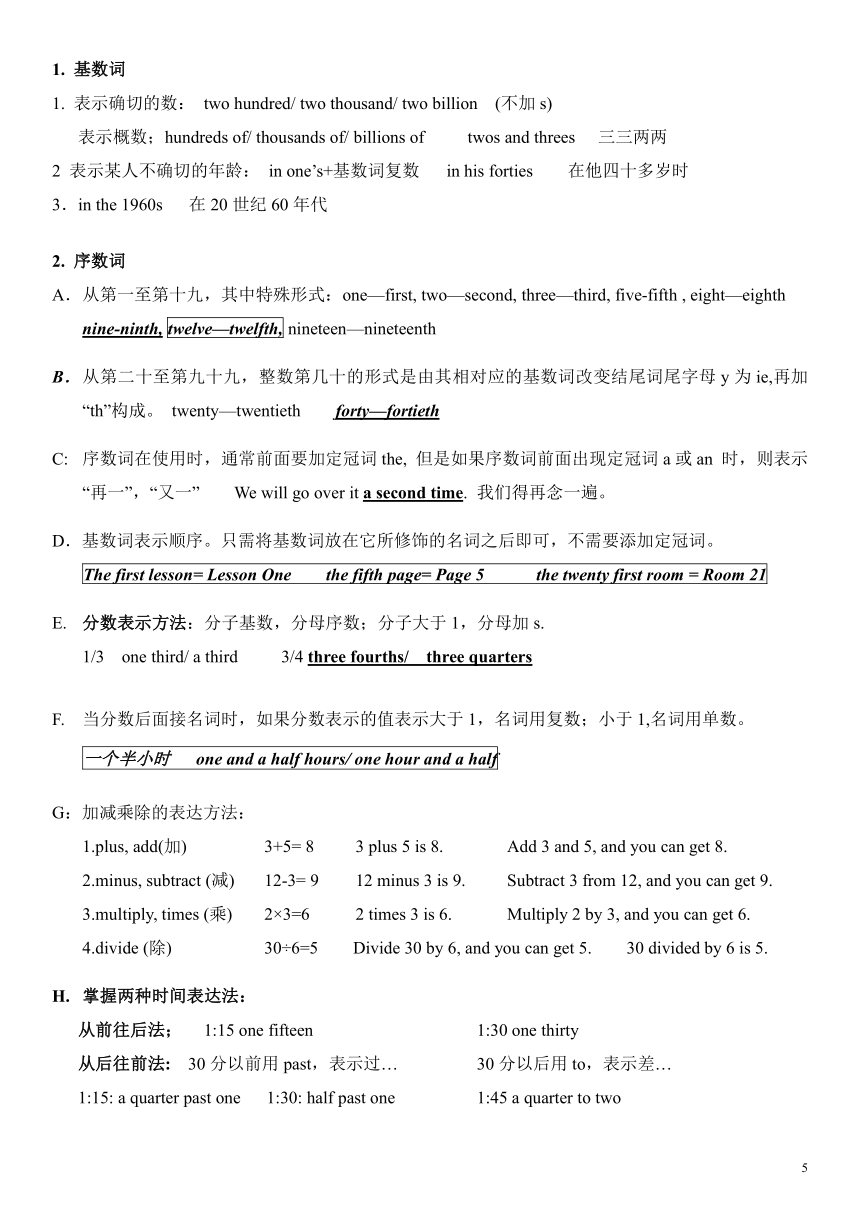
文档简介
(培优-教师)个性化教学辅导教案
课题 八上Unit 1-4 (期中复习)
教学目标 1.复习Unit1-4的词汇&短语用法2.掌握Unit1-4的语法
重点 词汇短语的灵活运用 难点 不定代词、比较级和最高级用法
考点 阅读&完型&语法填空训练 易错点 动词用法、比较级
知识点复习:一、复习笔记; 二、复习Unit1-4词汇和短语; 三、复习错题
1. be made of由什么制成(看得出原料) 2. depend on依靠
3. a pair of... 一双 4. in addition 除....以外(还)
5. grand total总计 6. look forward to期待
7. instead of 而不是 8. since then自那以来
9. keep in touch with与...保持联系 10. in the daytime在白天
11. keep...off 使......不接近,远离 12. at the same time同时
13. speak to... 和...说话 14. at the start of...在......的开始
15. begin/start to do...开始做某事 16. play computer games玩电脑游戏
17. work as 从事....工作 18. at a fast speed以很快的速度
19. for example例如 20. be good at...擅长做某事
21.happen to... 发生于;偶然发生 22. stop to do...停下来去做另外一件事
23. in front of 在前面 24. have nothing to do...无事可做
25. write emails to... 写邮件给 26. be good/bad for...对...有益/害
27. make a mess一团糟 28. millions of...数以百万计的
29. refer to... 参考,涉及到 30. turn into...变成
31. used to do... 过去常常做某事 32. throw away扔掉
33. use...to do... 使用什么做某事 34. be able to do...能够做某事
35. get/be used to doing sth. 习惯做某事 36. decide to do...决定做某事
37. be unaware of... 未意识到 38. allow sb.to do...允许做某事
39. have to do…不得不 40. help sb.do sth.帮助某人做某事
Unit 1 Encyclopedias
一、重点词句
1. look up 查(字典等);向上看 要求将宾格代词放在词组中间,如:look it up
2. be born 出生 一般用过去时 They were born in Beijing. 他们出生于北京。
3. from an early age 早年 = when he was young
4. learn to do sth 学会做某事 = learn doing sth learn by oneself 自学
learn about …from 从...学到/了解到...
They learn about China from the movie. 他们从电影中来了解中国。
5. perhaps 可能 It is perhaps / may be the most famous painting in the world.
Perhaps / Maybe it is the most famous painting in the world.
6. include (v.) 包括 =have something inside including (prep.) 包括
His notebooks include some interesting drawings of flying machines.
He doesn’t like animals, including (include) cats.
7. more than =over 超过 no more than = less than 不超过
8. everywhere = here and there= every place 处处
9. some… others… 一些…另一些…
one…the other….一个…另一个 (总共两个、两部分….)
I have two pens. One is red, the other is green. 我有两支笔,一支红的,一支绿的。
another… (三者或以上中的)另一个
Would you like another cake 要不要再吃个蛋糕?(蛋糕的总数多于3个)
other adj. 别的 +名词,如:other students
others n. 另一些 后面不需要名词。如:Others were as big as ten elephants.
10. as … as 像…一样 as busy as a bee 忙如蜂 as white as snow 白如雪
11. die out 灭绝 = disappear = become dead
die v.死 death n. 死亡 dead adj. 死的 现在分词 dying 过去式 died
12. Nobody knows why. = No one knows the reason.
some-; any-; no-等不定代词用法:
(1)nobody/somebody/ no one/ anyone/something/… 做主语,谓语动词用单数。
(2)somebody= someone anybody=anyone nobody= no one
(3)肯定句用some-; 否定句用any-
--Is there anything in the room 房间里有什么吗?
--No, there’s nothing. 什么也没有。
be made in 在某地制造 It was made in Shenzhen. 这是在深圳制造的。
14.语法:不定代词
some & any 的用法
some修饰可数和不可数名词,用于肯定句或希望得到对方肯定回答的问句。
any修饰可数和不可数名词。用于否定句和疑问句。
I don’t have any money. Could you lend me some money
特殊情况:
some用在疑问句中,表示建议、请求或期望得到肯定回答;
eg: Would you like some apples What about some tea
any 用于肯定句中,起强调作用表示任何,“任一”。
eg: Any student can answer the question.
Somebody/ someone/something/ anything/everything…..
someone/ something…用于肯定句中;
something 可用于表示提建议或建议的疑问中,希望得到肯定回答;
2. anybody/ anyone/ anything用于否定句和疑问句中;anyone 用于肯定句中,表示任何人。
anything用于肯 定句中,表示任何物,事。
nobody/ no one/nothing
1.nobody = not..anybody 没有一个人 2.nothing = not..anything 什么也没有(指事)
3.no one = none 一个人也没有(但是none 强调没有人或物)
不定代词的用法:
1.不定代词在句中作主语时,谓语动词一般用单数。 Nobody knows his name.
2.不定代词+形容词 (不定代词的定语要后置) something important
3.have something to do 有事情要做
4.There is something/ nothing wrong with …..某人有/没有问题
二、词形变化补充
1. Italian adj. & n. 意大利人,意大利语, 意大利的 Italy n.意大利
2. invent v. 发明 inventor n. 发明家 invention n.发明物
3. music n. 音乐 musician n. 音乐家 musical adj.音乐的
4. scientist n. 科学家 science n. 科学 scientific adj. 科学的
5. intelligence n. 聪明 intelligent adj. 聪明的
Unit 2 Numbers
一、语言要点
1. challenge sb. to (do) sth = have a match with sb 向某人挑战(做)某事
He challenges her to baseball. = to play baseball. 他向她挑战棒球。
2. promise v.& n. 答应
(1)promise sb to do sth 答应某人做某事
He promised (her) to buy a birthday gift for her. 他答应为她买个生日礼物。
make a promise 承诺 break the promise 违反承诺 keep the promise 保持承诺
3. would like sth 想要某物 would like to do = want to do 想要做某事
常用的句型有:
What would you like to do 你想要做什么? I would like to visit Guilin. 我想去参观桂林。
What would you like 你想要什么? I would like some tea. 我想来些茶。
Would you like to go to my party 你来不来参加我的晚会? Yes, I’d love/ like to .
Would you like some tea 你是要点茶还是咖啡? Yes, please. No, thanks.
4. rest n. 剩余部分; 休息 have/take a rest 休息
the rest of 其余的… The rest of the books are mine. 其余的书是我的。
5. instead adv.代替 多用在句末(字面上常不译出来)
He planned to Beijing, but later he went to Paris instead. 他计划去北京,后来去了巴黎。
instead of= in place of 代替…, 而不是 用在句中。instead of +doing sth
He went to Paris instead of Beijing. 他去了巴黎而不是北京。
He stayed at home instead of going swimming. 他呆在家里而不是去游泳。
order sb. to do sth. 命令某人做某事 order (v)命令 (n.) 次序;定单
7. realize 认识到 = know / understand
He realized what he said was wrong. 他认识到他的话错了。
8. enough 足够
adj./ adv.+enough 如:big enough 够大 fast enough 够快
enough+n. 如:enough food 足够食物
enough…to… 足够…去做… She is old enough to go to school.她够大去读书了。
9. the number of … …的数目是;强调数目是多少 a number of = a lot of/some
The number of students is (be) over 2000. 学生的数量超过2000.
A number of visitors went to Japan for holiday. 许多游客去日本度假。
语法---数词用法
基数词
1. 表示确切的数: two hundred/ two thousand/ two billion (不加s)
表示概数;hundreds of/ thousands of/ billions of twos and threes 三三两两
2 表示某人不确切的年龄: in one’s+基数词复数 in his forties 在他四十多岁时
3.in the 1960s 在20世纪60年代
序数词
从第一至第十九,其中特殊形式:one—first, two—second, three—third, five-fifth , eight—eighth
nine-ninth, twelve—twelfth, nineteen—nineteenth
从第二十至第九十九,整数第几十的形式是由其相对应的基数词改变结尾词尾字母y为ie,再加“th”构成。 twenty—twentieth forty—fortieth
C: 序数词在使用时,通常前面要加定冠词the, 但是如果序数词前面出现定冠词a或an 时,则表示 “再一”,“又一” We will go over it a second time. 我们得再念一遍。
D.基数词表示顺序。只需将基数词放在它所修饰的名词之后即可,不需要添加定冠词。
The first lesson= Lesson One the fifth page= Page 5 the twenty first room = Room 21
分数表示方法:分子基数,分母序数;分子大于1,分母加s.
1/3 one third/ a third 3/4 three fourths/ three quarters
当分数后面接名词时,如果分数表示的值表示大于1,名词用复数;小于1,名词用单数。
一个半小时 one and a half hours/ one hour and a half
G:加减乘除的表达方法:
1.plus, add(加) 3+5= 8 3 plus 5 is 8. Add 3 and 5, and you can get 8.
2.minus, subtract (减) 12-3= 9 12 minus 3 is 9. Subtract 3 from 12, and you can get 9.
3.multiply, times (乘) 2×3=6 2 times 3 is 6. Multiply 2 by 3, and you can get 6.
4.divide (除) 30÷6=5 Divide 30 by 6, and you can get 5. 30 divided by 6 is 5.
H. 掌握两种时间表达法:
从前往后法; 1:15 one fifteen 1:30 one thirty
从后往前法: 30分以前用past,表示过… 30分以后用to,表示差…
1:15: a quarter past one 1:30: half past one 1:45 a quarter to two
(3)掌握常考的不规则变化的序数词
first, second, third, fifth, eight—eighth,
nine—ninth,12th – twelfth, 20th –twentieth, 40th --fortieth
二、词形变换补充
1. wise adj. 充满智慧的 wisdom n. 智慧 2. gold n. 金子golden adj. 金黄色的
3. correctly adv.正确地 correct adj.正确的 correct v.改正
Unit 3 Computers
一、重点短语
1. work as从事…工作 He worked as a teacher. 他的工作是教师。
2. be unaware of 没意识到;未察觉 = don’t realize / know about
3. depend on 依靠… independent 独立的 adj.
Don’t depend on others. Be independent. 不要依靠别人。要独立。
4. in addition 除…以外(还) = what’s more = besides
5. be able to 能够 be随人称和时间而变化
He was able to (= could) ride a bike when he was 6. 当他6岁时,他已经会骑车了。
6. have nothing to do = be free 无事可干, 有空的 I have nothing to do this Sunday.周日我有空。
7. look forward to+ n. / doing 盼望、期待
I’m looking forward to talking to you. 我正期待与你交谈。
8. change our lives 改变我们的生活 life复数:lives
9. be made of 由…制成 (看得见原材料) Ice cream is made of ice.
be made from 由…制成 (看不见原材料) Paper is made from trees.
10. Thank sb for doing sth. 为某事感谢某人。
Thank you for asking me to the party. 谢谢你邀请我参加晚会。
11. spend (v),表示“花费金钱、时间” spend - spent - spent
①spend…on sth. 在某事上花费(金钱、时间)
②spend…(in) doing sth. 花费(金钱、时间)去做某事
③spend time with sb. 花时间和某人待在一起
如:He spends too much money on clothes. 他花费太多钱在衣着上。
He spent 3 days ( in ) reading the book. 他花了三天的时间读这本书。
pay for 花费金钱 如:I paid 10 yuan for the book. 我花了10元买这本书
12. used to do sth. 过去常常做某事 be used to doing sth. 习惯做某事
The kings and queens used to live in the old castle. 国王和王后过去常常住在城堡里。
My father is used to smoking every day. 我爸爸习惯每天抽烟。
be used to do sth. 被用来做某事 Knives are used to cut. 刀被用来切割。
13. stop…from… 阻止…做某事
We must stop people from cutting down trees. 我们必须阻止人们砍树。
14. give some advice = give some suggestions 提出建议
advice n. 建议 (不可数名词) advise v. 建议 advise sb to do sth
15. 语法—比较级和最高级主要考点
(1) good-better-best bad-worse-worst old-older/elder-oldest/eldest
little-less-least some-more-most far-farther/further-farthest/furthest
(2) smaller and smaller 越来越小 more and more dangerous 越来越危险
(3) I think this one is much better. (much/ a little/ a lot/ even可修饰比较级)
(4) Tim is taller than any other boy in his class. (than any other+ n.单数)
(5) Shenzhen is one of the most beautiful cities in the world.(one of+最高级) “最…之一”
形容词比较级用法:
(1)a little, a bit, much, even, still 等修饰时用比较级。 Eg: I feel even worse now.
(2)A+be动词+形容词比较级+than +B. Eg: He is taller than his brother.
(3)Who/ which +be+比较级,A or B Eg:Who is taller, Tim or Tom
(4)A+be+the 比较级+of the two. 表示两者中较…的那一个时比较级前要加the.
Eg:Tina is the taller of the two.
(5)比较级+and+比较级 “越来越…” Eg:It becomes warmer and warmer when spring comes.
多音节形容词用 “more and more +多音节形容词原级。
Eg: English is becoming more and more important.
(6)“the +比较级+句子(主语+谓语),the+比较级+句子(主语+谓语)” “越……越…”
Eg: The more money you make, the more you spend 钱你赚的越多,花得越多。
.相比较的前后两部分必须是同类比较。
My pencil is longer than ______(you).
(8).有些含比较级的句子,用that(单数、不可数名词)、those (复数名词)代替前面提到的词,以免重复。
The weather in Beijing is colder than _________________in Guangzhou in winter .
The boys in our class are more than ___________ in your class .
(9) 1)比较级+than+ any other +单数名词/ +the other +复数名词/ +anyone else / +any of the other+复名
2) Nobody else + 比较级 + than ……
Tom is the tallest boy in our class . Tom is taller than any other boy in our class.
Tom is taller than _____ ____ in our class. _____ _____ is taller than Tom in our class.
比较时不能与自身相比
注: 当相比较的两者属于同一范围/类别时,为了与自身相比较, 要用any other +单数名词。若两 者不属于同一范围/类别时,不必用other,直接用any + 单数名词.
He is taller than any other boy in his class. / He is taller than any boy in our class .
形容词最高级:
(1)表示三个或三个以上人或事物进行比较有以下词: in our class, in the world, of the three.
Eg: My sister is the tallest in my family.
Who/which +be+最高级, A,B或C Eg:Who is the tallest, Tom, John or Jim
…+be+one of +the 最高级+复数名词(最…之一)
Eg: He is one of the tallest students in our school.
…+be+the 最高级+of the three/ of all.(三个以上或全部之中)
Eg: He is the tallest of the three.
(5)形容词最高级前面用序数词,表示第几…,其结构为:“the +序数词+形容词最高级+单数名词。”
Hainan Island is the second largest island in China.
二、词形变换补充
1. speak v. 说话 speaker n. 演讲者、音响 speech n. 说话、演讲
2. operate v. 操作 operation n. 操作 operator n. 操作者
3. produce v. 生产、产生 production n. 生产 producer n. 生产者
Unit 4 Inventions
一、语言要点
1. They help people live a better life. 他们帮助人们过上更好的生活。
live a happy life 过着快乐的生活 live a healthy life 过健康生活
2. a few thousand years ago 几千年前
a few 一些 修饰可数名词 a little 一点 修饰不可数名词
few 很少的 表否定 little 极少的 表否定
Without the wheel, we would not have these inventions.
= If there was no wheel, we would not have ….
without prep. 没有 反义词:with
He changed the picture without thinking. 他不假思索换了那张图。
4. since then 自那以来(通常与完成时态连用)
5. speak to each other = talk to each other 相互谈话
6. Today millions of people across the world own mobile phones.
= Today millions of people in the world have mobile phone.
million, hundred, thousand与of搭配时用复数: thousands of 成千的 hundreds of 成百的
7. They allow people to keep in touch with each other anytime, anywhere.
allow sb to do sth. 允许某人做某事
Mother allows me to watch TV on weekend. 妈妈允许我周末看电视。
keep in touch with= connect with与…保持联系 Remember to keep in touch with me.
8. at night= in the evening 在晚上 in the daytime = during the day 在白天
9. imagine doing sth 想象做某事 Can you imagine living without them
imagine v. 想象 imagination n.
10. keep…off 避开 keep the dust off your shoes 让鞋子避开灰尘
11. use…for sth = use … to do sth 用来做某事
My dad uses it for his job. My mum uses it to buy clothes. 爸爸用它工作,妈妈用它买衣服。
12. a great success 巨大的成功
success n. 成功 succeed v. successful adj.
13. 形容词原级用法 as…as…
(1)very, so, too, enough, quite 修饰形容词原级。 Eg: The book is very/ quite interesting.
(2) as +adj./adv. 原形+as 象…一样
(not)as / so+adj./adv.原形+as 不如 … 用于否定句
This computer is as expensive as that one. 这台电脑和那台一样贵。
Xiaomi is not so famous as iphone. 小米没有iphone那么出名。
He doesn’t write as carefully as me. 他写字不如我认真。
(3) as+many+ 可数名词复数 +as eg: He bought as many books as you can.
as+much +不可数名词+as eg: He throws as much paper as Lucy.
(4) be +形容词原级+enough to do sth 足以做某事 Eg: He is old enough to go to school by himself
(5) It is +形容词原级+for sb to do sth 对某人来说做某事...... Eg: It is easy for us to learn English well.
It is +形容词原级+of sb +to do sth 某人做某事..... eg: It is kind of you to help me.
(6).形容词用来修饰名词或代词,一般直接放在被修饰词之前
如:an interesting book, an important meeting,但是注意,修饰something, everything, nothing, anything, anybody, anyone等时放在后面。如:something wrong,
二、词形变换补充
1. funny n. 好笑的、滑稽的 fun n. 乐趣、有趣的事 & adj. 有趣的
2. create v. 创造 creation n. creative adj.有创造力的 creator n.创造者
3. comfortable adj. 使人舒服的 comfort n.&v. 安慰 uncomfortable adj. 使人不舒服的
4. invent v. 发明、创造 inventor n. 发明家 invention n. 发明物
5. practical adj. 有用的、实用的 practice n. 练习 practise v. 练习
6. distance n. 距离 distant adj. 遥远的 distantly adv. 遥远地
7. develop v. 发展 development n. 发展
developing adj. 发展中的 developed adj. 发达的
4
课题 八上Unit 1-4 (期中复习)
教学目标 1.复习Unit1-4的词汇&短语用法2.掌握Unit1-4的语法
重点 词汇短语的灵活运用 难点 不定代词、比较级和最高级用法
考点 阅读&完型&语法填空训练 易错点 动词用法、比较级
知识点复习:一、复习笔记; 二、复习Unit1-4词汇和短语; 三、复习错题
1. be made of由什么制成(看得出原料) 2. depend on依靠
3. a pair of... 一双 4. in addition 除....以外(还)
5. grand total总计 6. look forward to期待
7. instead of 而不是 8. since then自那以来
9. keep in touch with与...保持联系 10. in the daytime在白天
11. keep...off 使......不接近,远离 12. at the same time同时
13. speak to... 和...说话 14. at the start of...在......的开始
15. begin/start to do...开始做某事 16. play computer games玩电脑游戏
17. work as 从事....工作 18. at a fast speed以很快的速度
19. for example例如 20. be good at...擅长做某事
21.happen to... 发生于;偶然发生 22. stop to do...停下来去做另外一件事
23. in front of 在前面 24. have nothing to do...无事可做
25. write emails to... 写邮件给 26. be good/bad for...对...有益/害
27. make a mess一团糟 28. millions of...数以百万计的
29. refer to... 参考,涉及到 30. turn into...变成
31. used to do... 过去常常做某事 32. throw away扔掉
33. use...to do... 使用什么做某事 34. be able to do...能够做某事
35. get/be used to doing sth. 习惯做某事 36. decide to do...决定做某事
37. be unaware of... 未意识到 38. allow sb.to do...允许做某事
39. have to do…不得不 40. help sb.do sth.帮助某人做某事
Unit 1 Encyclopedias
一、重点词句
1. look up 查(字典等);向上看 要求将宾格代词放在词组中间,如:look it up
2. be born 出生 一般用过去时 They were born in Beijing. 他们出生于北京。
3. from an early age 早年 = when he was young
4. learn to do sth 学会做某事 = learn doing sth learn by oneself 自学
learn about …from 从...学到/了解到...
They learn about China from the movie. 他们从电影中来了解中国。
5. perhaps 可能 It is perhaps / may be the most famous painting in the world.
Perhaps / Maybe it is the most famous painting in the world.
6. include (v.) 包括 =have something inside including (prep.) 包括
His notebooks include some interesting drawings of flying machines.
He doesn’t like animals, including (include) cats.
7. more than =over 超过 no more than = less than 不超过
8. everywhere = here and there= every place 处处
9. some… others… 一些…另一些…
one…the other….一个…另一个 (总共两个、两部分….)
I have two pens. One is red, the other is green. 我有两支笔,一支红的,一支绿的。
another… (三者或以上中的)另一个
Would you like another cake 要不要再吃个蛋糕?(蛋糕的总数多于3个)
other adj. 别的 +名词,如:other students
others n. 另一些 后面不需要名词。如:Others were as big as ten elephants.
10. as … as 像…一样 as busy as a bee 忙如蜂 as white as snow 白如雪
11. die out 灭绝 = disappear = become dead
die v.死 death n. 死亡 dead adj. 死的 现在分词 dying 过去式 died
12. Nobody knows why. = No one knows the reason.
some-; any-; no-等不定代词用法:
(1)nobody/somebody/ no one/ anyone/something/… 做主语,谓语动词用单数。
(2)somebody= someone anybody=anyone nobody= no one
(3)肯定句用some-; 否定句用any-
--Is there anything in the room 房间里有什么吗?
--No, there’s nothing. 什么也没有。
be made in 在某地制造 It was made in Shenzhen. 这是在深圳制造的。
14.语法:不定代词
some & any 的用法
some修饰可数和不可数名词,用于肯定句或希望得到对方肯定回答的问句。
any修饰可数和不可数名词。用于否定句和疑问句。
I don’t have any money. Could you lend me some money
特殊情况:
some用在疑问句中,表示建议、请求或期望得到肯定回答;
eg: Would you like some apples What about some tea
any 用于肯定句中,起强调作用表示任何,“任一”。
eg: Any student can answer the question.
Somebody/ someone/something/ anything/everything…..
someone/ something…用于肯定句中;
something 可用于表示提建议或建议的疑问中,希望得到肯定回答;
2. anybody/ anyone/ anything用于否定句和疑问句中;anyone 用于肯定句中,表示任何人。
anything用于肯 定句中,表示任何物,事。
nobody/ no one/nothing
1.nobody = not..anybody 没有一个人 2.nothing = not..anything 什么也没有(指事)
3.no one = none 一个人也没有(但是none 强调没有人或物)
不定代词的用法:
1.不定代词在句中作主语时,谓语动词一般用单数。 Nobody knows his name.
2.不定代词+形容词 (不定代词的定语要后置) something important
3.have something to do 有事情要做
4.There is something/ nothing wrong with …..某人有/没有问题
二、词形变化补充
1. Italian adj. & n. 意大利人,意大利语, 意大利的 Italy n.意大利
2. invent v. 发明 inventor n. 发明家 invention n.发明物
3. music n. 音乐 musician n. 音乐家 musical adj.音乐的
4. scientist n. 科学家 science n. 科学 scientific adj. 科学的
5. intelligence n. 聪明 intelligent adj. 聪明的
Unit 2 Numbers
一、语言要点
1. challenge sb. to (do) sth = have a match with sb 向某人挑战(做)某事
He challenges her to baseball. = to play baseball. 他向她挑战棒球。
2. promise v.& n. 答应
(1)promise sb to do sth 答应某人做某事
He promised (her) to buy a birthday gift for her. 他答应为她买个生日礼物。
make a promise 承诺 break the promise 违反承诺 keep the promise 保持承诺
3. would like sth 想要某物 would like to do = want to do 想要做某事
常用的句型有:
What would you like to do 你想要做什么? I would like to visit Guilin. 我想去参观桂林。
What would you like 你想要什么? I would like some tea. 我想来些茶。
Would you like to go to my party 你来不来参加我的晚会? Yes, I’d love/ like to .
Would you like some tea 你是要点茶还是咖啡? Yes, please. No, thanks.
4. rest n. 剩余部分; 休息 have/take a rest 休息
the rest of 其余的… The rest of the books are mine. 其余的书是我的。
5. instead adv.代替 多用在句末(字面上常不译出来)
He planned to Beijing, but later he went to Paris instead. 他计划去北京,后来去了巴黎。
instead of= in place of 代替…, 而不是 用在句中。instead of +doing sth
He went to Paris instead of Beijing. 他去了巴黎而不是北京。
He stayed at home instead of going swimming. 他呆在家里而不是去游泳。
order sb. to do sth. 命令某人做某事 order (v)命令 (n.) 次序;定单
7. realize 认识到 = know / understand
He realized what he said was wrong. 他认识到他的话错了。
8. enough 足够
adj./ adv.+enough 如:big enough 够大 fast enough 够快
enough+n. 如:enough food 足够食物
enough…to… 足够…去做… She is old enough to go to school.她够大去读书了。
9. the number of … …的数目是;强调数目是多少 a number of = a lot of/some
The number of students is (be) over 2000. 学生的数量超过2000.
A number of visitors went to Japan for holiday. 许多游客去日本度假。
语法---数词用法
基数词
1. 表示确切的数: two hundred/ two thousand/ two billion (不加s)
表示概数;hundreds of/ thousands of/ billions of twos and threes 三三两两
2 表示某人不确切的年龄: in one’s+基数词复数 in his forties 在他四十多岁时
3.in the 1960s 在20世纪60年代
序数词
从第一至第十九,其中特殊形式:one—first, two—second, three—third, five-fifth , eight—eighth
nine-ninth, twelve—twelfth, nineteen—nineteenth
从第二十至第九十九,整数第几十的形式是由其相对应的基数词改变结尾词尾字母y为ie,再加“th”构成。 twenty—twentieth forty—fortieth
C: 序数词在使用时,通常前面要加定冠词the, 但是如果序数词前面出现定冠词a或an 时,则表示 “再一”,“又一” We will go over it a second time. 我们得再念一遍。
D.基数词表示顺序。只需将基数词放在它所修饰的名词之后即可,不需要添加定冠词。
The first lesson= Lesson One the fifth page= Page 5 the twenty first room = Room 21
分数表示方法:分子基数,分母序数;分子大于1,分母加s.
1/3 one third/ a third 3/4 three fourths/ three quarters
当分数后面接名词时,如果分数表示的值表示大于1,名词用复数;小于1,名词用单数。
一个半小时 one and a half hours/ one hour and a half
G:加减乘除的表达方法:
1.plus, add(加) 3+5= 8 3 plus 5 is 8. Add 3 and 5, and you can get 8.
2.minus, subtract (减) 12-3= 9 12 minus 3 is 9. Subtract 3 from 12, and you can get 9.
3.multiply, times (乘) 2×3=6 2 times 3 is 6. Multiply 2 by 3, and you can get 6.
4.divide (除) 30÷6=5 Divide 30 by 6, and you can get 5. 30 divided by 6 is 5.
H. 掌握两种时间表达法:
从前往后法; 1:15 one fifteen 1:30 one thirty
从后往前法: 30分以前用past,表示过… 30分以后用to,表示差…
1:15: a quarter past one 1:30: half past one 1:45 a quarter to two
(3)掌握常考的不规则变化的序数词
first, second, third, fifth, eight—eighth,
nine—ninth,12th – twelfth, 20th –twentieth, 40th --fortieth
二、词形变换补充
1. wise adj. 充满智慧的 wisdom n. 智慧 2. gold n. 金子golden adj. 金黄色的
3. correctly adv.正确地 correct adj.正确的 correct v.改正
Unit 3 Computers
一、重点短语
1. work as从事…工作 He worked as a teacher. 他的工作是教师。
2. be unaware of 没意识到;未察觉 = don’t realize / know about
3. depend on 依靠… independent 独立的 adj.
Don’t depend on others. Be independent. 不要依靠别人。要独立。
4. in addition 除…以外(还) = what’s more = besides
5. be able to 能够 be随人称和时间而变化
He was able to (= could) ride a bike when he was 6. 当他6岁时,他已经会骑车了。
6. have nothing to do = be free 无事可干, 有空的 I have nothing to do this Sunday.周日我有空。
7. look forward to+ n. / doing 盼望、期待
I’m looking forward to talking to you. 我正期待与你交谈。
8. change our lives 改变我们的生活 life复数:lives
9. be made of 由…制成 (看得见原材料) Ice cream is made of ice.
be made from 由…制成 (看不见原材料) Paper is made from trees.
10. Thank sb for doing sth. 为某事感谢某人。
Thank you for asking me to the party. 谢谢你邀请我参加晚会。
11. spend (v),表示“花费金钱、时间” spend - spent - spent
①spend…on sth. 在某事上花费(金钱、时间)
②spend…(in) doing sth. 花费(金钱、时间)去做某事
③spend time with sb. 花时间和某人待在一起
如:He spends too much money on clothes. 他花费太多钱在衣着上。
He spent 3 days ( in ) reading the book. 他花了三天的时间读这本书。
pay for 花费金钱 如:I paid 10 yuan for the book. 我花了10元买这本书
12. used to do sth. 过去常常做某事 be used to doing sth. 习惯做某事
The kings and queens used to live in the old castle. 国王和王后过去常常住在城堡里。
My father is used to smoking every day. 我爸爸习惯每天抽烟。
be used to do sth. 被用来做某事 Knives are used to cut. 刀被用来切割。
13. stop…from… 阻止…做某事
We must stop people from cutting down trees. 我们必须阻止人们砍树。
14. give some advice = give some suggestions 提出建议
advice n. 建议 (不可数名词) advise v. 建议 advise sb to do sth
15. 语法—比较级和最高级主要考点
(1) good-better-best bad-worse-worst old-older/elder-oldest/eldest
little-less-least some-more-most far-farther/further-farthest/furthest
(2) smaller and smaller 越来越小 more and more dangerous 越来越危险
(3) I think this one is much better. (much/ a little/ a lot/ even可修饰比较级)
(4) Tim is taller than any other boy in his class. (than any other+ n.单数)
(5) Shenzhen is one of the most beautiful cities in the world.(one of+最高级) “最…之一”
形容词比较级用法:
(1)a little, a bit, much, even, still 等修饰时用比较级。 Eg: I feel even worse now.
(2)A+be动词+形容词比较级+than +B. Eg: He is taller than his brother.
(3)Who/ which +be+比较级,A or B Eg:Who is taller, Tim or Tom
(4)A+be+the 比较级+of the two. 表示两者中较…的那一个时比较级前要加the.
Eg:Tina is the taller of the two.
(5)比较级+and+比较级 “越来越…” Eg:It becomes warmer and warmer when spring comes.
多音节形容词用 “more and more +多音节形容词原级。
Eg: English is becoming more and more important.
(6)“the +比较级+句子(主语+谓语),the+比较级+句子(主语+谓语)” “越……越…”
Eg: The more money you make, the more you spend 钱你赚的越多,花得越多。
.相比较的前后两部分必须是同类比较。
My pencil is longer than ______(you).
(8).有些含比较级的句子,用that(单数、不可数名词)、those (复数名词)代替前面提到的词,以免重复。
The weather in Beijing is colder than _________________in Guangzhou in winter .
The boys in our class are more than ___________ in your class .
(9) 1)比较级+than+ any other +单数名词/ +the other +复数名词/ +anyone else / +any of the other+复名
2) Nobody else + 比较级 + than ……
Tom is the tallest boy in our class . Tom is taller than any other boy in our class.
Tom is taller than _____ ____ in our class. _____ _____ is taller than Tom in our class.
比较时不能与自身相比
注: 当相比较的两者属于同一范围/类别时,为了与自身相比较, 要用any other +单数名词。若两 者不属于同一范围/类别时,不必用other,直接用any + 单数名词.
He is taller than any other boy in his class. / He is taller than any boy in our class .
形容词最高级:
(1)表示三个或三个以上人或事物进行比较有以下词: in our class, in the world, of the three.
Eg: My sister is the tallest in my family.
Who/which +be+最高级, A,B或C Eg:Who is the tallest, Tom, John or Jim
…+be+one of +the 最高级+复数名词(最…之一)
Eg: He is one of the tallest students in our school.
…+be+the 最高级+of the three/ of all.(三个以上或全部之中)
Eg: He is the tallest of the three.
(5)形容词最高级前面用序数词,表示第几…,其结构为:“the +序数词+形容词最高级+单数名词。”
Hainan Island is the second largest island in China.
二、词形变换补充
1. speak v. 说话 speaker n. 演讲者、音响 speech n. 说话、演讲
2. operate v. 操作 operation n. 操作 operator n. 操作者
3. produce v. 生产、产生 production n. 生产 producer n. 生产者
Unit 4 Inventions
一、语言要点
1. They help people live a better life. 他们帮助人们过上更好的生活。
live a happy life 过着快乐的生活 live a healthy life 过健康生活
2. a few thousand years ago 几千年前
a few 一些 修饰可数名词 a little 一点 修饰不可数名词
few 很少的 表否定 little 极少的 表否定
Without the wheel, we would not have these inventions.
= If there was no wheel, we would not have ….
without prep. 没有 反义词:with
He changed the picture without thinking. 他不假思索换了那张图。
4. since then 自那以来(通常与完成时态连用)
5. speak to each other = talk to each other 相互谈话
6. Today millions of people across the world own mobile phones.
= Today millions of people in the world have mobile phone.
million, hundred, thousand与of搭配时用复数: thousands of 成千的 hundreds of 成百的
7. They allow people to keep in touch with each other anytime, anywhere.
allow sb to do sth. 允许某人做某事
Mother allows me to watch TV on weekend. 妈妈允许我周末看电视。
keep in touch with= connect with与…保持联系 Remember to keep in touch with me.
8. at night= in the evening 在晚上 in the daytime = during the day 在白天
9. imagine doing sth 想象做某事 Can you imagine living without them
imagine v. 想象 imagination n.
10. keep…off 避开 keep the dust off your shoes 让鞋子避开灰尘
11. use…for sth = use … to do sth 用来做某事
My dad uses it for his job. My mum uses it to buy clothes. 爸爸用它工作,妈妈用它买衣服。
12. a great success 巨大的成功
success n. 成功 succeed v. successful adj.
13. 形容词原级用法 as…as…
(1)very, so, too, enough, quite 修饰形容词原级。 Eg: The book is very/ quite interesting.
(2) as +adj./adv. 原形+as 象…一样
(not)as / so+adj./adv.原形+as 不如 … 用于否定句
This computer is as expensive as that one. 这台电脑和那台一样贵。
Xiaomi is not so famous as iphone. 小米没有iphone那么出名。
He doesn’t write as carefully as me. 他写字不如我认真。
(3) as+many+ 可数名词复数 +as eg: He bought as many books as you can.
as+much +不可数名词+as eg: He throws as much paper as Lucy.
(4) be +形容词原级+enough to do sth 足以做某事 Eg: He is old enough to go to school by himself
(5) It is +形容词原级+for sb to do sth 对某人来说做某事...... Eg: It is easy for us to learn English well.
It is +形容词原级+of sb +to do sth 某人做某事..... eg: It is kind of you to help me.
(6).形容词用来修饰名词或代词,一般直接放在被修饰词之前
如:an interesting book, an important meeting,但是注意,修饰something, everything, nothing, anything, anybody, anyone等时放在后面。如:something wrong,
二、词形变换补充
1. funny n. 好笑的、滑稽的 fun n. 乐趣、有趣的事 & adj. 有趣的
2. create v. 创造 creation n. creative adj.有创造力的 creator n.创造者
3. comfortable adj. 使人舒服的 comfort n.&v. 安慰 uncomfortable adj. 使人不舒服的
4. invent v. 发明、创造 inventor n. 发明家 invention n. 发明物
5. practical adj. 有用的、实用的 practice n. 练习 practise v. 练习
6. distance n. 距离 distant adj. 遥远的 distantly adv. 遥远地
7. develop v. 发展 development n. 发展
developing adj. 发展中的 developed adj. 发达的
4
同课章节目录
